Our communities in focus: Top 10 photos of 2021
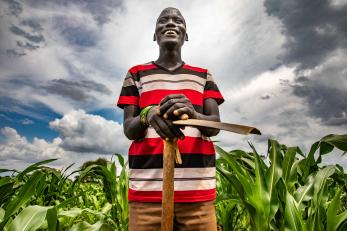
I am writing from the small mountain town of Jumla, nestled high in the Himalayan foothills of Western Nepal. In this remote area, our teams are helping farmers establish dependable water sources, grow more productive and resilient crops, and prepare for emergencies. Our work here exemplifies our holistic, community-based approach. It’s humbling to see first-hand, and a real honor to photograph, the communities we serve.
At the start of the 2021, we depended more than ever on our global staff and freelancers for photography due to COVID‑19 travel lockdowns. By May we were out gathering photos again, with trips to Uganda, Iraq, Yemen, and Nepal. I have been a photographer for the last 20 years; the 14 months I was locked down at home were a powerful personal lesson in how much I love my job. I will never take it for granted again.
Being back out in our global community was a stark reminder that while COVID‑19 may dominate our lives and headlines, in many places it is just one of a myriad of crises, along with food insecurity, drought, conflict, poverty, and other infectious diseases. Mercy Corps’ work continues in the face of these challenges, and takes on even more importance with every passing year. Our partnerships with communities and supporters reached over 50 million people in more than 40 countries in the last year. If challenges like climate change and a pandemic have taught us anything, it’s that the only way we can make it through these times is through cooperation.
The top ten photos are compelling, both visually and in the stories behind the images. From the dedication of our Haiti team to provide emergency supplies in the aftermath of a magnitude 7.2 earthquake, to helping smallholder farmers cope with climate change, I’m proud to share these stories of the people at the heart of our work.
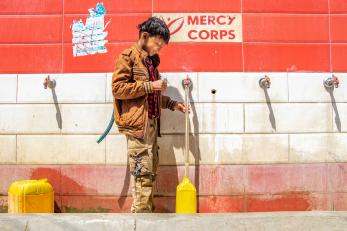
I met Raed, 9, as he filled a jerrycan at a water point built by Mercy Corps. Access to potable water is difficult in his community, as it is across the country. More than 15 million people lack access to clean water and sanitation in Yemen, heightening the risk of water-borne illnesses and COVID‑19. Water pumps and treatment facilities have been damaged by the ongoing conflict, and there isn’t enough fuel to run most water systems. In response, Mercy Corps is building and rehabilitating water infrastructure, including water systems, dams, and wells.
This water point is only a few kilometers from the front lines of the conflict. At night I was kept awake by loud artillery fire and could see tracer rounds flying overhead. It was another reminder of the bravery and resilience of both my Yemeni colleagues and the community members they work with. This photo features strong graphical elements, powerful colour, and the reflection of the sun off the wall lights Raed’s face so we can see his expression.
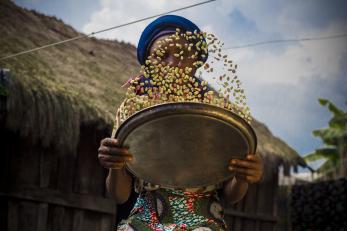
Charlotte, 44, farms corn, beans, cabbage, and eggplant in order to support her eight children. She belongs to a farmers group, along with 47 of her neighbours; they work together to maximise their productivity and support each other through the ups and downs of agriculture. Mercy Corps connected them to local markets to sell their crops, help improve their technique, use better seeds, and manage their money.
Christian: “Charlotte is an example in her village - an inspiring woman without fear. She was holding a plate full of beans, she stopped and welcomed the team. I came to realise that she is a woman that oversees so many activities, and she is courageous. I asked her to continue tossing beans in the air, and the different colours on each and every bean was the representation of her multiple activities. I wanted to show how determined she is in all the activities and groups she contributes.”
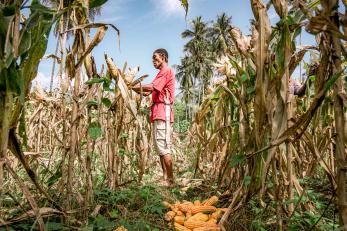
On smallholder farms in Indonesia, farmers like Amrin, in Sigi District, face great risks from natural disasters and climate change. Mercy Corps is connecting farmers with resources to boost their incomes and provide greater resiliency to withstand climate-related shocks and stresses. I like the way this photo is shot very wide to include all the context and detail of the cornfield, filling the frame with context all the way to the edges. The corn at the bottom illustrates the story well, and the muted colours are effective in creating a feeling of warmth.
Mohammed: “The natural disaster of the earthquake, tsunami, and liquefaction that occurred in Palu and its surrounding districts in 2018 affected most of the agricultural land, including Amrin and his farmer group. The disaster made it worse for them since it was hard for them to access capital for their work. When photographing Amrin at his farm in Pulu Village, his energy and optimism is felt because he works harder to achieve maximum results not only for himself, but also for his farmer group.”
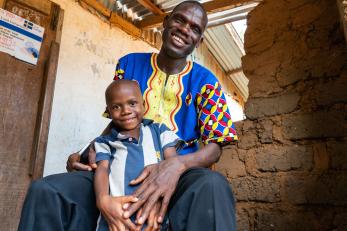
Edwin, 32, received training and a grant from Mercy Corps, which enabled him to purchase fabric and a sewing machine, rent this space, and start his own tailoring business. It has made it possible for him to support his family, including his 4-year-old son Edwin Jr., seen here sitting on his lap in front of his shop. Edwin has a disability and has struggled to earn a steady income in the past, due to the area’s limited job and education opportunities, but he says his tailoring livelihood has given him back his dignity.
Carielle: “I wanted to show Edwin in a powerful position that reflected his confidence, so I chose a low-angle, or “hero” shot. I liked the affection between him and his son, the way Edwin towered over the boy, who leaned back onto his father. The photo makes me think of trust. The boy knows his father takes care of him. I think this is a really telling image, because Edwin's story shows that if people are given opportunities, even with disabilities, they can take care of themselves and their families. In Liberia, we don't often see images like this about people with disabilities. I wish more Liberians could see this image of Edwin.”
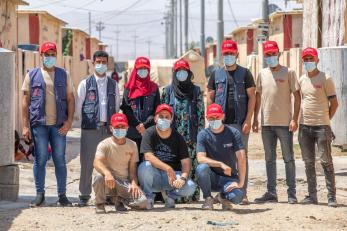
The Mercy Corps Water, Sanitation, and Hygiene (WASH) team in Erbil, Iraq includes 30 hygiene promoters, borehole operators, water monitors, technicians, and water testers. Together they implement WASH programming in three camps near Erbil: Harsham, Baharka and Debaga, which host 13,500 residents who rely on Mercy Corps for clean water, dependable sanitation, and hygiene education. The majority of this team are residents of the camp, which means that when security issues or COVID‑19 outbreaks close the camp to outsiders, they can continue to maintain the crucial water and sanitation services. It’s a great example of when Mercy Corps is needed, we are already part of the community.
When I met this team in Debaga camp and saw how unified and part of the community they were, a group photo made perfect sense. I used a long lens to compress the background, while their powerful postures and eye contact reveal the strength and dedication they bring to their work.
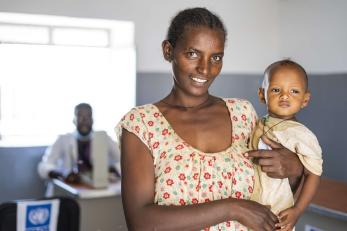
Medhne and her 10-month-old son visit with Dr. Mohamed at the Um Rakuba health center. The Mercy Corps-supported clinic is the main medical facility in the refugee camp, supporting an average of 30-50 patients per day. The Um Rakuba camp currently houses about 18,000 refugees from the conflict in Ethiopia.
Ala’s photos are always powerful. He has a great connection with people that you can see in his images. This one is no different, and also features great soft light in Medhne’s eyes, a strong pose, and framing and depth of field that tell the story.
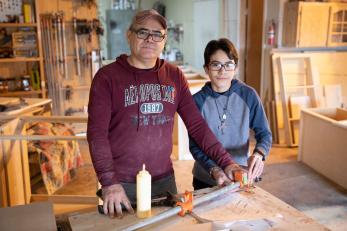
This is Antonio and his 14-year-old son Zuzim at his small carpentry business called Abzuya. Born in Mexico, Antonio learned carpentry from his father and brothers before moving to the United States. After living in San Jose, he spent the last ten years in Walla Walla, Washington with his wife and three sons. He opened his shop in late 2019, right before COVID‑19 struck. He participated in a Mercy Corps Northwest programme which helped him get all the licenses he needed to open his shop, taught him business management skills, and provided a $4,000 grant.
This was my first time out taking photos since March 2020. It was great to connect to people again. Antonio warmly welcomed me into his shop, and was clearly proud to show off his business, as well as his son who is excelling in school. I believe the photo reflects his pride, connection to his son, and the hard work he has put into his shop.
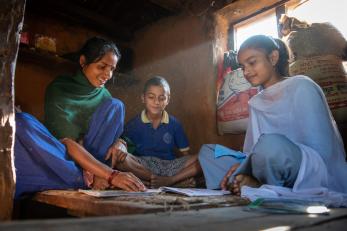
Laxmi helps her son and daughter with their homework. She is a school teacher, and in order to make ends meet she has recently taken up dairy farming, with two cows in a shed behind her home. In this remote valley, she and her neighbours face harsh winters and limited access to water. Climate change has resulted in unpredictable rainfall patterns that affect crop production, as well as increased frequency of landslides. Laxmi received training and a grant for her dairy farming from Mercy Corps, where we have been working in her community since 2011.
Anytime I see light beams like this slicing through a scene I can’t put my camera down. That light, combined with the family intimacy and composition make this one of my favorite photos from this visit to Nepal.
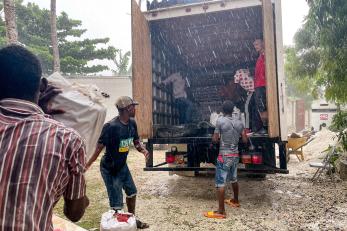
When a 7.2 magnitude earthquake struck Haiti on August 14th, our team sprang into action, with memories of the devastating 2015 earthquake in the back of their minds. They worked tirelessly for 12 hours a day, day after day, even as Tropical Storm Grace made landfall mere days following the earthquake. The torrential rain caused mudslides throughout L’Asile, making it difficult to reach residents who most needed supplies. This image shows the team taking delivery of supplies in a deluge, in preparation for kit distributions to the communities who were most impacted.
Christy: “It's no surprise that this photo from the Haiti earthquake response shows so much movement and action. From when they first felt the shocks of the earthquake, Mercy Corps team members working near the epicenter started canvassing communities to assess the damage. From that moment, it seemed as though we never stopped moving. On the day I shot this photo, we were unloading trucks of supplies we'd ordered: diapers, toothpaste, mattresses, tarps. Just as this truck pulled up, dark clouds that had been gathering burst open with a torrent of rain. The team never hesitated, formed an assembly line and began unloading, counting, and organising our new stocks for distribution. I turned to our Nippes team lead, Edryne Michel, who shrugged and smiled as we worked together, ‘It's still hurricane season.’”
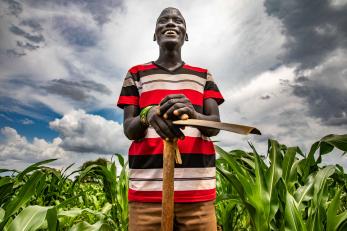
Stephen, 30, takes a break from working in his maize field. Stephen provides for his five children through farming, a difficult task in an agricultural area with increasingly inconsistent rainfall. He says his harvests are vulnerable to dry spells and severe flooding, both of which destroy crops, and he struggles with food shortages for two to three months of every year. Two years ago, Stephen and his neighbours participated in a Mercy Corps training to learn about drought-resistant crops and improved agricultural techniques. Together, they started a farmer group to maintain a plot of maize. The practices they’ve implemented have greatly improved their crop yields.
At first glance Stephen’s photo may appear to be a story about one man, but the reality is that climate change is a challenge that affects us all, and can only be solved by working together. Stephen’s optimism shines through with his big smile, standing strong among his crops. The vivid colours, contrast, and symmetry create a bold photo of Stephen looking toward a brighter future—making this one of my favorite images of 2021.
